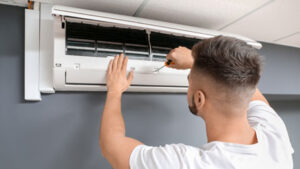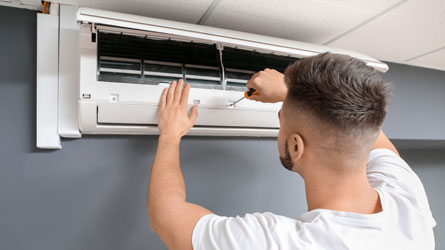If your air conditioner is acting up, you may need to hire a professional to do the job for you. The air conditioning repairman will need to see your thermostat to determine if it is malfunctioning. If the thermostat is set properly, the air conditioner should activate and cool your home. If it doesn’t work, the problem may be a faulty or poorly connected wire.
There are many factors to consider when deciding between repairing and replacing an air conditioner. For instance, the cost to repair a unit can be thousands of dollars, so it is important to consider how old the unit is. If the AC is more than eight years old, repairing is probably not the best option. In that case, you may want to consider replacing the unit instead. You can also decide to repair the air conditioner if the unit is simply experiencing problems, such as debris clogging the condenser unit or a worn fan belt. In addition, a repair technician will examine the insulation level in the house and the ductwork that delivers cool air to your home. These two factors can increase the effectiveness of the system.
Another factor to consider is whether the air conditioning unit is covered under warranty. If the unit is under warranty, the cost of repair can be covered by the manufacturer. However, you must contact the manufacturer to verify the details. Some home warranties also cover the cost of repairing a unit.
Another factor that determines the cost of air conditioner repair is labor. Most repair technicians charge a minimum service call fee, which covers the time it takes them to diagnose the unit and replace any damaged parts. The service call fee may be anywhere from $75 to $200, while parts can cost anywhere from a few dollars to several thousand dollars. Additionally, some technicians charge up to $150 per hour.
Fortunately, many newer air conditioning units are covered by warranty protection. This warranty protects the system from defects and typically covers a system for half or more of its lifespan. However, if you’ve already exceeded the warranty term, it might be better to replace the unit.
When performing AC repair, checking for refrigerant leaks is an important step. Refrigerant leaks can cause a host of problems, from a high-pitched sound to a smell. If you suspect a leak, you should remove the parts and inspect them carefully. You should wear gloves to protect yourself from contamination and avoid cuts from sharp objects.
A leak can be caused by water or refrigerant. While some older systems still use Freon, many modern systems use different types of refrigerant. To spot a leak, start by checking the line. A leaky line will attract dirt and appear oily or discolored.
Another technique for checking for leaks is to use a corona suppression detector. This device works by using a special fitting. Once lit, it warms up the refrigerant molecules. The refrigerant then flows towards a center collection wire. The resulting current level indicates the presence of a leak. While a corona suppression detector is not always reliable, it is an excellent way to find a leak if you’re unsure.
Another way to detect a leak is to inspect the pipes around the AC. This will reveal where the leak is. A professional HVAC technician should be able to locate and fix the leak as soon as possible. A leak in the pipe can be repaired by tightening the valve or reconnecting the fitting. It may also mean that the system needs to be recharged with the right kind of refrigerant.
Leaks are a major issue for an AC system and can leave you hot and can also increase energy costs. A trained air conditioning technician will use a variety of techniques to detect a leak and make the repair easier. One of these methods involves using an old-fashioned method known as the soap bubble test. It involves applying a solution of soap and water to the area with a brush or squeeze bottle. If the refrigerant is escaping, the solution will cause bubbles to form. However, this method is not as effective for small leaks or if it’s a windy day.

